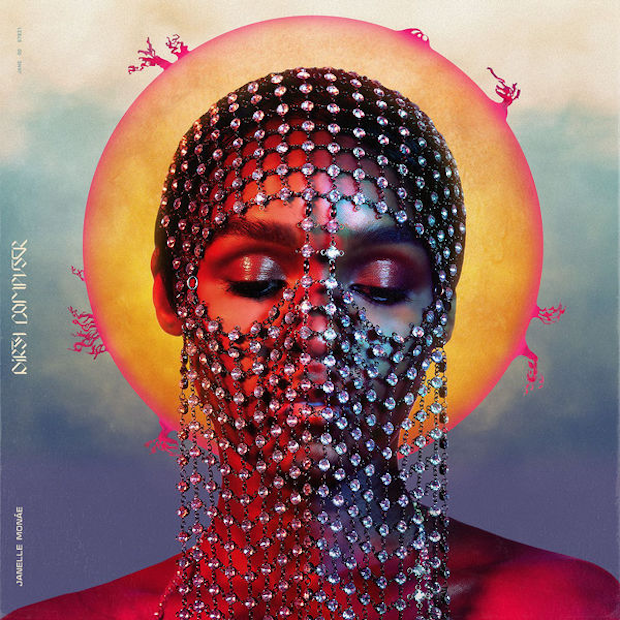Brevity and directness are not Janelle Monáe's things. Her albums, when they arrive, are vast and sprawling and messily ambitious. In the past, she's collided R&B with new wave and Broadway and psychedelic indie rock and abstract jazz and operatic funk-pop, and she's done it while telling goofily all-consuming stories about identity-proscribing dystopias and "robot love." There's never one single point to what she does. She doesn't make simple, easily digestible music. Instead, she invents whole new aesthetic worlds, and she invites us to get lost in them. Nevertheless, there's a moment on "Screwed," a neon bounce from her third proper album, Dirty Computer, where Monáe offers up something that sounds a bit like a statement of intent: "You fucked the world up now / We'll fuck it all back down.
Dirty Computer isn't a boudoir album. It's bright and silly and jittery, and there are precious few slow songs. It's not an album for dimming lights or burning candles. You wouldn't put it on to set a mood unless you were hosting an ecstatic costume party. And yet Dirty Computer is a sex album. It's an album about the soul-liberating possibilities of fucking, of losing yourself in another person's body (or maybe other people's bodies). It's there in the giddy Princely trob of "Make Me Feel" and the bright-pastel twinkle of "Crazy, Classic, Life" and slow-blooming gooiness of "Don't Judge Me." It's no accident that Monáe came out as pansexual less than 24 hours before releasing the album. Dirty Computer is an album about the euphoria of figuring out that the restrictions on you are imaginary, that there's a whole world of possibility out there for you.
But Dirty Computer is also an album that acknowledges and confronts our present-day dystopia. It's a joyous album, not an angry one, but the anger comes through in slippery, sidelong ways. In the self-affirming rap verse on "I Like That," Monáe confronts the bully who called her a 6 when she was a kid. She confronts her own self-limiting doubts, too: "Even though you tell me you love me, I’m afraid that you just love my disguise." "We gon' start a motherfucking pussy riot," she barks on the deeply impressive rap throwdown "Django Jane," "Or we gon' have to put 'em on a pussy diet." Near the end of the album closer "Americans," a sort of Princed-out take on rockabilly on which Monáe asserts her own right to call herself as American as anyone else, a Martin Luther King-esque speaker crows, "It's gonna be my America before it's all over." It's the most optimistic artistic take on Trumpism that I've heard anyone offer yet.
I've had trouble with past Monáe records because, at least from where I was sitting, they were doing too much. There would be moments of incandescent pop-music magic, and then there would be maximalist explosions of jazz hands that would just lose me completely. Monáe was always an obvious monster talent, but she didn't always give the impression that she knew or cared how to channel or direct that talent. That's not a problem on Dirty Computer. The album still roams all over the musical map, and it still delights in the psychedelic magical realism of its lyrical imagery: "The birds fly high, and they wink at all of the grandmothers on the ground." But all these leaps come in the form of tight, hooky, immediately likable party music. She's still seeking transcendence, but she's doing it through pop music, and history has shown that pop music is a pretty good route to transcendence.
Pop history is clearly on Monáe's mind. Pop geniuses from a bunch of different generations come through, adding their voices to what Monáe is doing. Brian Wilson, Stevie Wonder, Pharrell Williams, Grimes -- they're all here. None of them are the focus; all are content to play supporting roles. (Wonder literally just phones in a message of universal love.) But their presence matters. So does the most present absence: Prince, Monáe's friend and admirer and most obvious inspiration. Prince didn't survive long enough to contribute directly to Dirty Computer. But to hear Monáe tell it, he served as an invaluable sounding board when the album was still in its planning stages, suggesting influences and equipment. There are Prince-esque moments all through Dirty Computer, and they feel like loving homages, not rip-offs. In involving themselves in Monáe's work, all these different geniuses are implicitly identifying Monáe as one of their own, as someone who deserves to be among their ranks. Dirty Computer is where Monáe proves it.
It's been nearly five years since Monáe released The Electric Lady, her last album. In the intervening time, she's become a movie star. Her first two screen roles were in Moonlight and Hidden Figures, which means that, as an actor, Monáe currently has the highest batting average we've seen since John Cazale died. Those two movies were powerful and emotional and full of an almost radical empathy. They took big chances, and they resonated within the larger culture almost as pop spectacles. They weren't overtly political, exactly, but they still worked as important reminders of the humanity of people who are so often denied that humanity, and they arrived at a moment when we really needed movies like that. As I write this, I've only been listening Dirty Computer for a day, but it already feels like it functions in the same way.
Nobody could've planned this, but Dirty Computer arrives after a week of Kanye West's MAGA breakdown, one of the most depressing and confusing sagas that I've had the misfortune to chronicle in my years as a music writer. Maybe your life is healthy and balanced enough that the political fluctuations of distant celebrities can't fuck up your mood. If that's the case, I salute you. But this Kanye shit had me down. And so Monáe's album arrives as a glorious antidote, a work of overwhelming love that's still full of hooks and craft and showmanship. If we've lost Kanye West to his own attention-addicted demons forever, that's tragic, but it's not the end of the world. After all, there are other geniuses out there.
Dirty Computer is out now on Wondaland/Bad Boy/Atlantic.






